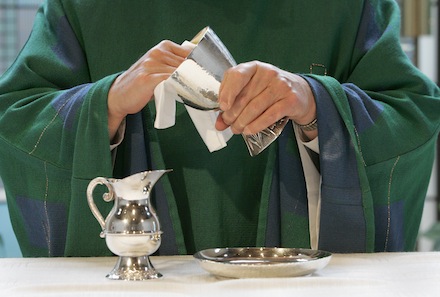
How to receive Holy Communion
The Blessed Sacrament is supposed to be consumed at once
By FR ALEXANDER LUCIE-SMITH on Wednesday, 10 October 2012
ABOUT THE AUTHOR

Fr Alexander Lucie-Smith
Alexander Lucie-Smith is a Catholic priest and a doctor of moral theology. On Twitter he is@ALucieSmith

Something unexpected happened to me the other day. A minister of another Church rang me up and said that he had been given a Sacred Host by a member of his congregation, with the request that the said minister should pass it to a Catholic priest.
Naturally, I said I would call round and collect the Sacred Host that very afternoon. I did so, recovered the Host, placed it in a pyx and heard the story.
A young lady had been at a Catholic Mass and had gone up to Holy Communion, even though she was not a Catholic – she had gone up because she had been urged to go up by the people sitting around her. Once at the altar the priest had placed the Sacred Host in her hands. She, not being in communion with the Catholic Church, did not want to receive the Host, so carried it away with her, and then entrusted it to the minister of her own church, who then called me.
Once I was at home, I disposed of the Host in the way that is prescribed by law.
This incident raises all sorts of questions.
First of all, such things can only happen when communion is given in the hand and the person receiving does not consume the Host at once. The Blessed Sacrament is supposed to be consumed at once, in sight of the altar; no one should carry it away, even if for only a few feet. How, though, can we stop them doing so? The only answer is that all, priest and congregation, must be vigilant and ensure that anyone attempting to carry away the Host is stopped. I realise that this may be difficult. I have heard stories of priests who have challenged people who were taking the Host away, and who have been abused for doing so.
Another thing we could do is emphasise to all that there is a correct way to receive Holy Communion.
Then of course there is the question of what to do when people present themselves for Holy Communion who seem unfamiliar with Catholic ritual. They ought not to be given Communion, but it can be hard to make this clear to them in the midst of the Communion procession.
While on this subject, I think most priests will have had, at one time or another, a request to receive Holy Communion from someone who is not a member of the Catholic Church. Refusal, no matter how carefully explained, tends to cause great resentment. I imagine most priests dread such approaches from our separated brethren. I certainly do.
Thank God this woman at least had the sense to know that she should deal with the host in some respectable way. She was probably too embarrassed to give it back to the priest directly. On her side, I wouldn't say there's much blame since she seemed to at least be somewhat aware of the gravity, and tried to deal with it. Now on the side of the parishioners who prodded her - who on earth does that??? If some else doesn't go forward for communion, isn't the correct thing to move past them as discretely as possible and leave them be? Of course, communion on the tongue would improve many things.
ReplyDelete